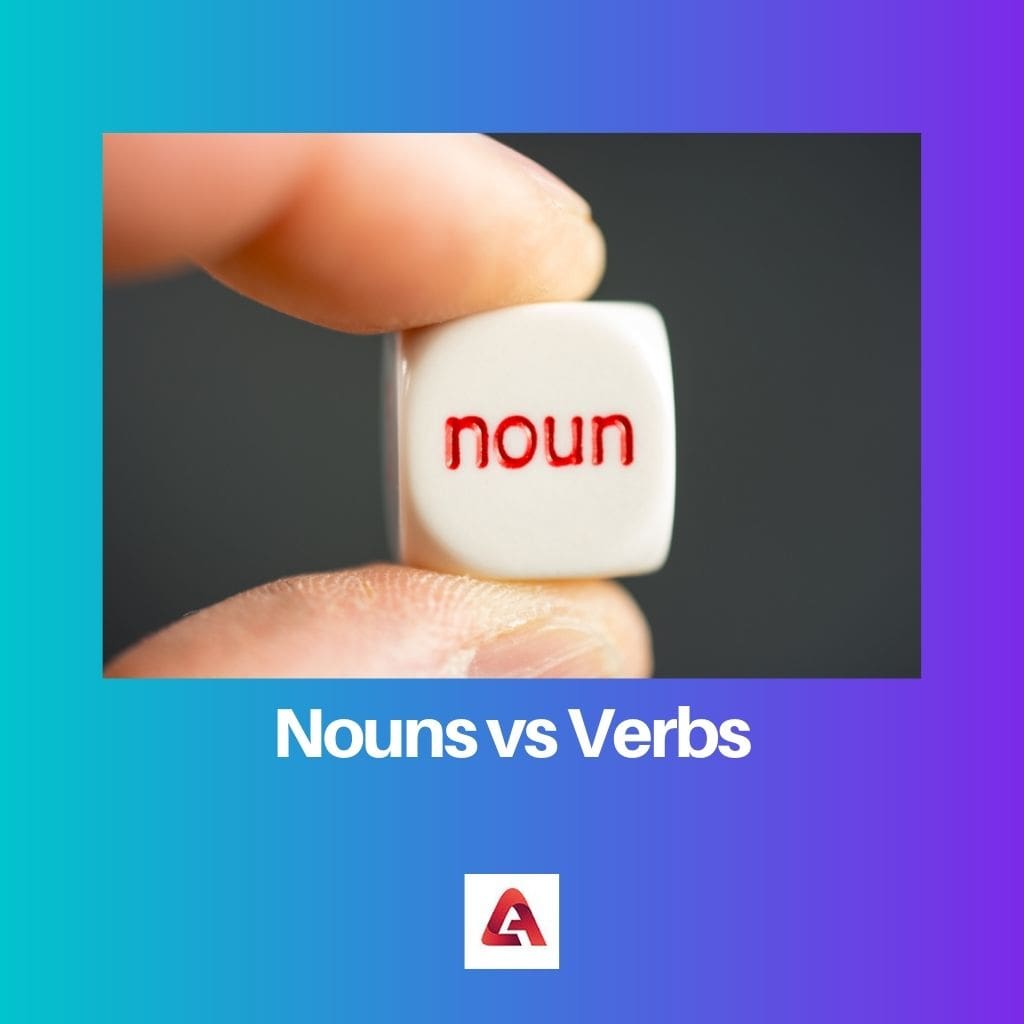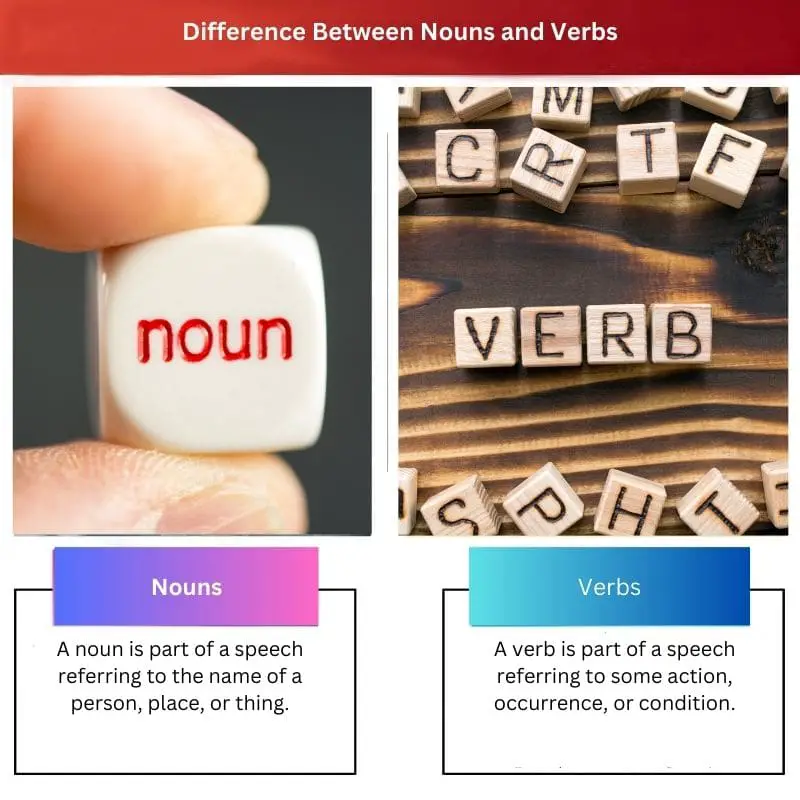We use grammar to arrange words to make proper meaningful sentences. Verbs, nouns, adverbs, adjectives, conjunctions, pronouns, etc., are included in word grammar.
Clauses, reported speech, phrases, etc., are in sentence grammar.
When we start understanding and learning grammar, we must learn the basic parts of speech. Nouns and verbs are the two most common and always-used parts of a speech.
To become a good writer or fluent speaker, knowing the difference between them is very important.
Key Takeaways
- Nouns represent people, places, things, ideas, or qualities, serving as the subjects or objects of sentences.
- Verbs are words that express actions, states, or occurrences, indicating what the subject of a sentence is doing or experiencing.
- Understanding the distinction between nouns and verbs is essential for forming grammatically correct sentences and conveying meaning in language.
Nouns vs Verbs
Noun is a word or a part of speech that refers to the name of a person, place, animal, or thing, and it can be the subject or the object in a sentence. Verb is a part of speech that refers to an action, condition, or occurrence, and it is an action word. It is the main part of the predicate in a sentence.

Comparison Table
| Parameter | Nouns | Verbs |
|---|---|---|
| Definition | A noun is part of a speech referring to the name of a person, place, or thing. | A verb is part of a speech referring to some action, occurrence, or condition. |
| Types | The various types of nouns are proper nouns, common nouns, abstract nouns, concrete nouns, collective nouns, countable nouns, and uncountable nouns. | The various types of verbs are transitive verbs, intransitive verbs, regular verbs, irregular verbs, linking verbs, and action verbs. |
| Part | They may be the subject or object of a sentence. | They are the main part of the predicate. |
| Role | A noun answers the question, ‘what?’ | A verb describes an action. |
| Examples | Italy, India, cow, girl, taste, teacher, water, children, milk, etc. | Walk, talk, sleep, study, read, type, sing, dance, etc. |
What is a Noun?
A noun is an important part of a speech referring to a person (Bill Gates), place (India), animal (cow), thing (table), idea (joy), or quality (gentleness). Nouns constitute the largest class of words in almost all languages.
They can be classified into various categories:
- Proper Nouns- A proper noun is a noun that refers to a particular person, place, or thing. They begin with a capital letter. Examples of proper nouns include London, Paris, Amitabh Bachan, Samsung, Nokia, World War 2, etc.
- Common nouns- A common noun refers to a person, place, or thing but not a particular person, place, or thing. Examples of common nouns include tiger, country, chair, etc.
- Abstract nouns- Abstract nouns are nouns that the five senses cannot feel; they cannot be seen, touched, smelt, or heard. Examples of abstract nouns include happiness, knowledge, taste, loyalty, etc.
- Concrete nouns- Concrete nouns are nouns that either of the five senses can identify. Examples of concrete nouns include boy, cat, book, cake, etc.
- Collective nouns- Collective nouns refer to a group. Examples include team, group, pack, staff, etc.
- Countable nouns- Countable nouns are nouns that can be counted in numbers. Examples of countable nouns include teeth, eggs, children, etc.
- Uncountable nouns- Uncountable nouns cannot be counted using numbers. Examples of uncountable nouns are sugar, research, knowledge, and liquid.

What is a verb?
A verb is part of a speech referring to some action, occurrence, experience, or condition. It is regarded as one of the essential parts of a sentence.
Verbs can be classified into various categories:
- Transitive verbs- Transitive verbs are verbs that require an object. The action is directed towards a place, person, or thing. Examples of transitive verbs include cut, give, kill, make, tell, etc.
- Intransitive verbs- Intransitive verbs do not require an object to complete the sentence. Examples of intransitive verbs include rain, bark, jog, hiding, etc.
- Action verbs- Action verbs are verbs that indicate some action. It shows some activity that a person, animal, or thing does. Examples of action verbs include singing, dancing, walking, talking, biting, etc.
- Linking verbs- A linking verb is a verb that connects the subject of the sentence with the predicate. They are also known as ‘State of being verbs’. Examples of such verbs include being, be, feel, etc.
- Irregular verbs– These verbs do not follow a regular conjugation pattern. Examples of irregular verbs include saying, drink, eat, swim, etc.
- Helping verbs- These verbs support the main verb. Examples include being, must, should, is, etc.

Main Differences Between Nouns and Verbs
- A noun is part of a speech that refers to a person, place, or thing. On the other hand, a verb is part of a speech referring to some action, experience, or condition.
- Nouns may be the subject or object in a sentence, whereas verbs form the central part of the predicate.
- The various types of nouns are proper nouns, common nouns, abstract nouns, concrete nouns, collective nouns, countable nouns, and uncountable nouns.
- The various types of verbs are transitive verbs, intransitive verbs, regular verbs, irregular verbs, linking verbs, and action verbs.
- A noun answers the question ‘what?’ whereas the verb is more of an action word.
- Examples of nouns include Paris, red, goat, chair, knowledge, friendship, boy, etc. Examples of verbs include laugh, smile, dance, enjoy, swim, say, etc.




